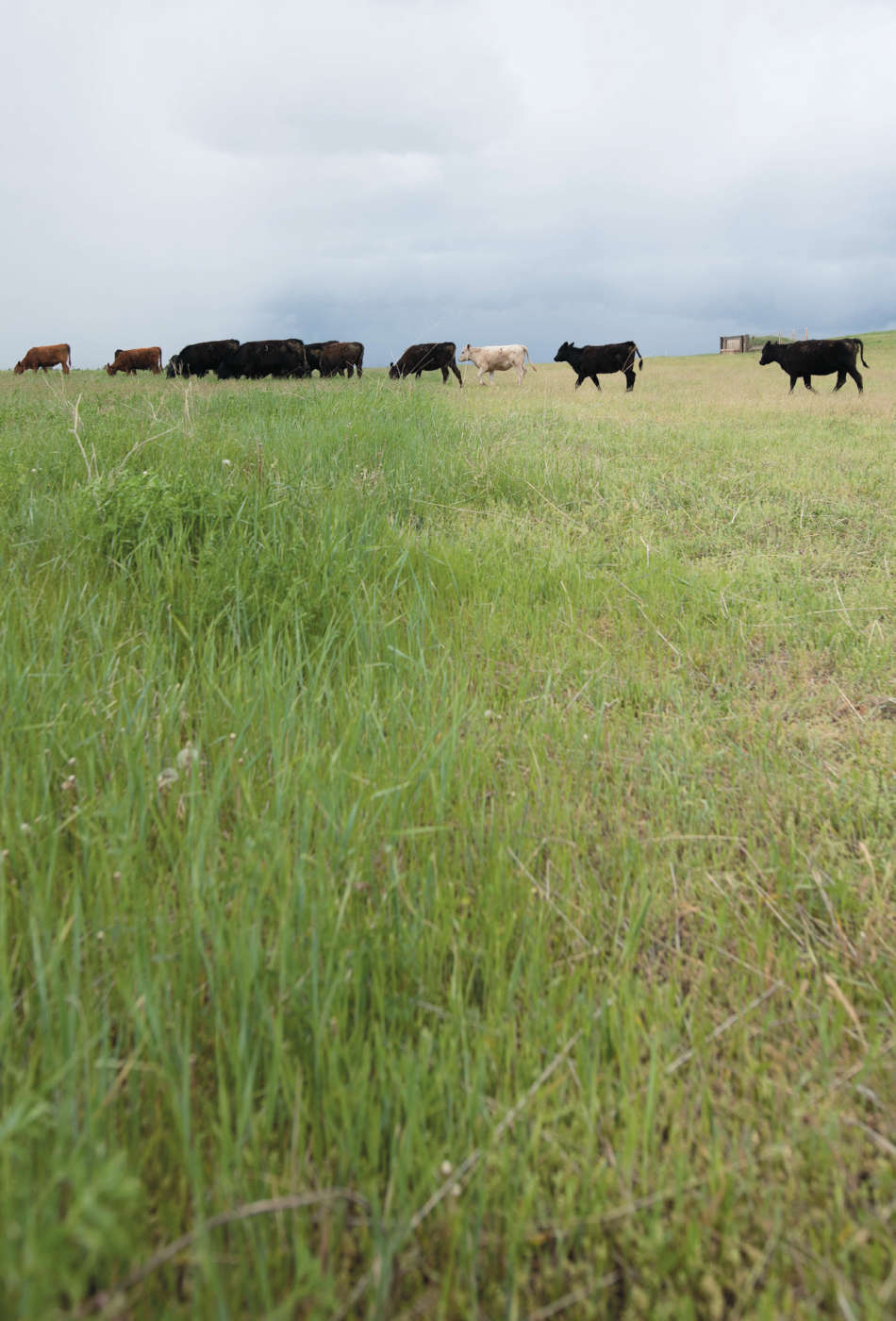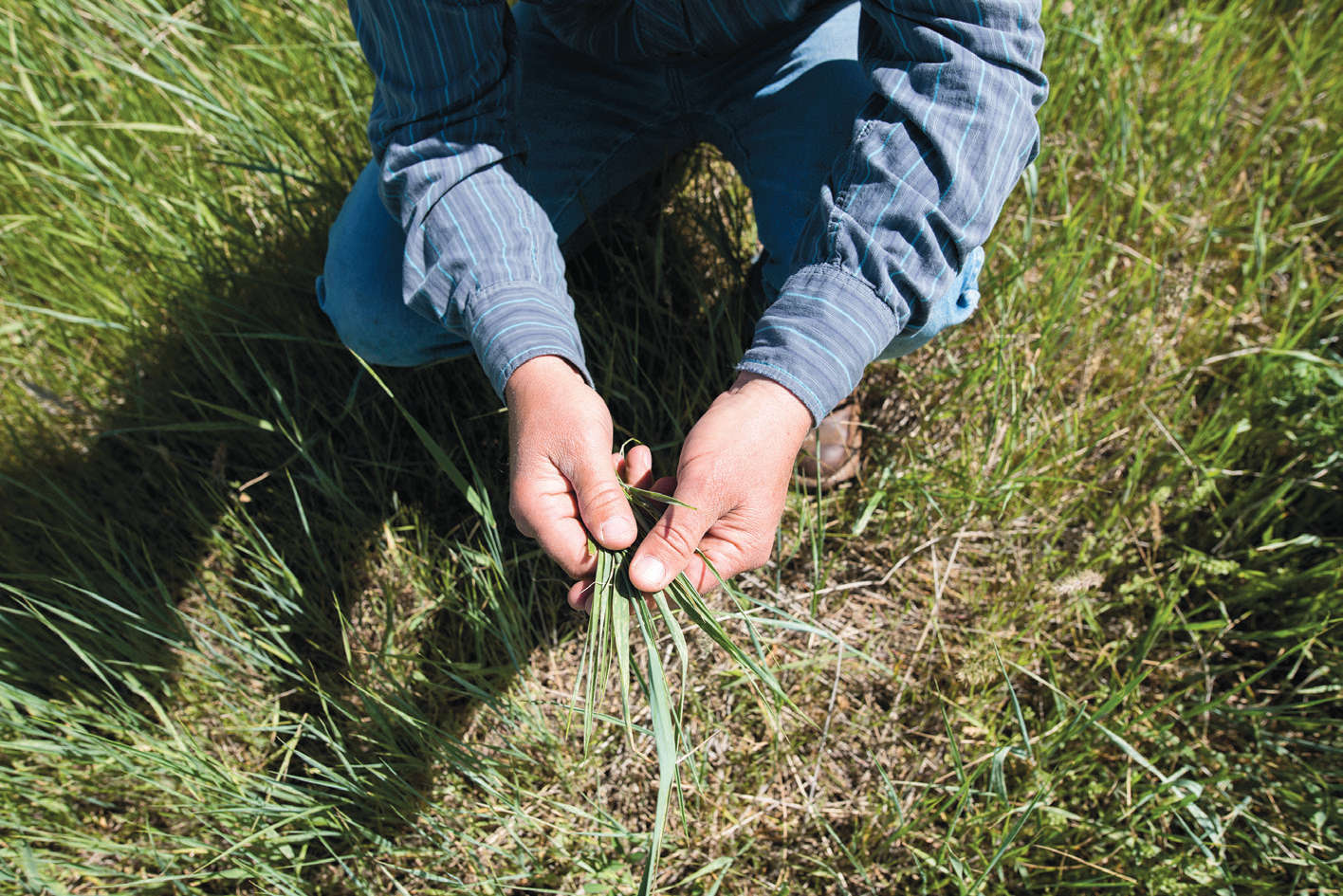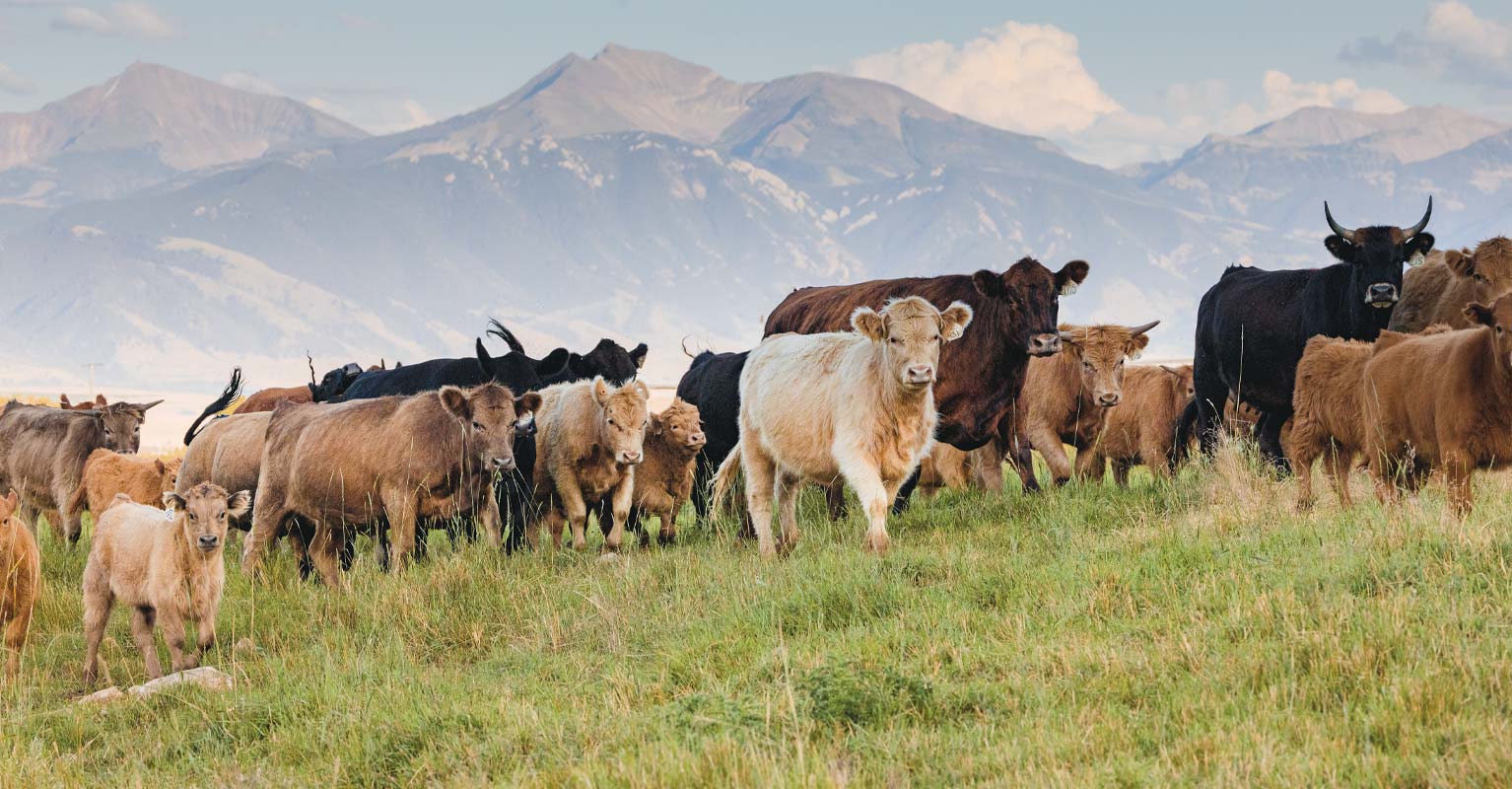Eric Wickens (left) of Wickens Ranch discusses pasture boundaries and fencing needs with ranch hand Dan Edwards (right).
Wickens Ranch Seeks to Raise Quality Beef
Settled enduringly in the hills just north of Winifred, Wickens Ranch exemplifies a quintessential Montana history. Homesteaded in 1911 and operated by the Wickens family since then, what began as a modest acreage now flourishes as a leading presence in the state’s ranching community. But while fourth-generation rancher Eric Wickens readily honors his family’s deep-rooted history with this land, he and his wife, Emma, are also making intentional, regenerative strides toward the future.
THROWING A LOOP
For over 15 years, the Wickenses have focused much of their attention on the health of their soil. By implementing management-intensive grazing practices, wherein cattle are rotated on small sections of pasture, nutrients from manure are returned and distributed to the soil more evenly, the decomposition of nutrient-dense ground cover desirably increases, and pastures are allowed ample rest periods to ensure healthy and efficient regrowth.
“The mix of higher-impact grazing like this combined with periods of total resting is like exercising your body,” Eric Wickens explains. “You have to put some stress on the system every once in a while to make some [improvements]. Land is a similar thing, it’s a living organism.”
Wickens monitors the impacts of his management practices in a variety of ways. He works with a local soil expert to sample and analyze his soil for bacteria, fungal, and mineral changes, for example, and uses a refractometer to evaluate the sugar levels of pasture foliage. When moving the herd to a new section of pasture, he’ll “throw a loop” (or several), tossing out a rope to randomly select a section of forage. Then he’ll weigh plant clippings from within each loop to calculate how much feed is available and just how long his cattle can optimally graze there.
“A lot of ranchers [determine grazing windows] by trial and error, but this is such a critical step,” he says.

A HOLISTIC APPROACH
Soil health leads to plant and pasture health, in turn yielding healthier cattle. But, of course, the Wickenses’ efforts toward ecological progress and beef quality don’t stop there. Subscribing to a holistic management approach, Wickens observes his cattle closely and utilizes natural herd behaviors to minimize stress and therefore further increase overall herd health “The more we can understand [our cattle], the more efficiently we can move them and the calmer they are. They’re generally happier and healthier,” he says, adding that he develops a strong relationship with his cattle. “I try not to, but I really get attached to the animals.”
In combination with his attention to soil health, thoughtful water management practices have also aided his grasslands by improving their biodiversity and overall vitality, both of which play a fundamental role in increasing native wildlife populations. A testament to these efforts, the ranch was recently named the 2024 recipient of the Montana Leopold Conservation Award, which recognizes ranchers, farmers, and forestland owners whose land stewardship is positively impacting the soil, water, and surrounding wildlife.
Committed to making an even broader impact on their community, the Wickenses also set out to share their knowledge of and successes with holistic management practices with other local producers. Wickens Ranch is currently seeking accreditation with the Savory Institute, a global nonprofit devoted to ecological regeneration, as Montana’s first Savory Hub and one of only 50 in the world. In this capacity, the Wickenses will host groups for educational workshops about regenerative agriculture.

MONTANA CROP-FINISHED
While it may go without saying that happy, healthy cattle are key to yielding nutritious and delicious beef, there’s more to the quality equation when it comes to Wickens beef. Devoted to maintaining a consistent, flavorful product year-round, the Wickenses finish their cattle right on the ranch and feed a ration consisting of dry forages like hay and a conservative amount of barley and peas they grow themselves and purchase from neighboring farms.
They also finish their cattle when they’re fully developed, much later in their natural growth cycle than many beef producers. Driven by the industrialized agricultural systems and market factors of our modern era, beef cattle are often finished and processed well before they are fully developed. The Wickenses, however, can finish their cattle in small groups and in shorter intervals while still achieving the high-quality beef they’re known for.
“We’re very Montana-centric. The animals come from here, they stay here, all the feed comes from Montana. The beef stays within our local communities.” —Eric Wickens Wickens Ranch

LOCAL ACCESS
From raising and finishing to processing and supplying, Wickens Ranch remains dedicated to keeping their beef in Montana. In continued harmony with their holistic outlook, they leave no supply chain stone unturned when it comes to finding ways to minimize their ecological impact while supporting local Montana communities and businesses.
“We’re very Montana-centric,” Wickens says. “The animals come from here, they stay here, all the feed comes from Montana. The beef stays within our local communities.”
Their beef is processed year-round in Columbus, and they work with the butcher to find ways to utilize rather than waste any by-product: Bones, fat, and organs are turned into bone broth, tallow, and pet treats. Since 2020, the Wickenses have offered products through a home-delivery service and supply beef directly to Bozeman- and Belgrade-area buyers five days a week. They also supply beef to several Bozeman-area restaurants and retailers—Kimpton Armory Hotel, Est. 1864, Shan, Mountains Walking Brewery & Pub, and Town & Country Foods, to name a few—and attend the Tuesday summer farmers market.
Certainly, from the soil that supports the feed that produces Wickens beef, all the way to their doorstep drop-off, the Wickens family is committed to an intentional management practice that can be measured, quantified, and tested. Perhaps the best test, second to tasting their beef, is a view of the ranch: thick vegetation, diverse plant species, and full, content cattle.




